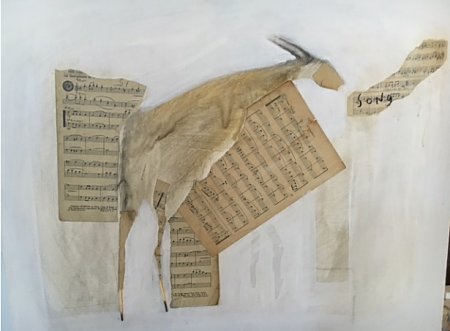
Receptions With the Poet
I had no intention of having my heart broken again. So the man I spent the most time with at Harvard was not only married with a son but was a foreign student who intended to return to Athens at the end of the term. I mention this marriage-defying affair only because of what that boyfriend said about Theodore Howland, who arrived in Cambridge one weekend to read at the Houghton Library.
I wondered what was so special about the Houghton Library that female students were not allowed to use it. I expected something mysterious, like you might find at a séance, but it was just a bookshelf-filled, hushed space like any other small library. I was excited to see my teacher again after a lapse of six months. I’d spoken fondly about him to my Greek boyfriend, who came with me to the late-afternoon reading.
There, at the podium, was Mr. Howland, with that cleft in his chin and a bit more gray in his bushy eyebrows. He had a straightforward way of presenting his poems, no drama, just the words with whatever power was in them. When the reading was finished, I had no luck getting close because Mr. Howland was surrounded by admirers. I was miffed because I thought of him as mine. I turned to retreat, raised my hand to wave a quick goodbye, and he called, “Wait. You’ll go with me to the reception.”
I worked my way through the crowd to find my boyfriend. “Did you like it?” I asked him. “No,” he said. “That guy’s got no balls.” This seemed an odd thing to say after a poetry reading, and I wondered if I was blind to something about Mr. Howland. This was the second disparaging thing I’d heard about my teacher. At college graduation my older sister had said, “That’s the one you like so much? That guy with the degenerate face?”
His reception was held at one of those charming antique houses that line the side streets near Harvard Square. The place was packed with students and with the luminaries of the Harvard English department. I sipped wine, lifted canapés off a tray held by a butler who circulated from guest to guest, and listened in on conversations. I kept hearing the words Mrs. Bernard DeVoto. I think we might have been in her house. The words were said with reverence, and I wondered how a woman could disappear so entirely that she would acquire the prominence earned by her husband’s work and would become known only by his name. I loved those words, Mrs. Bernard DeVoto, and said them to myself over and over instead of striking up a conversation with someone. I milled around for an hour or so then searched for Mr. Howland to say goodbye. He said, “No. You’ll stay for dinner.”
I imagined a banquet table with dozens of place settings, but there were only eight of us, and I was the only young person. We sat in straight-backed chairs in a circle in the living room in front of the fireplace, balancing plates on our laps. The Longfellow scholar told us about the time he and Doris had traveled by train to Chicago, where he was supposed to teach. Susie had just been born, and they didn’t know what to do with Susie’s dirty diapers, so the Longfellow scholar told us that he went to the back of the train and tossed the diapers out onto the tracks. Then he roared with laughter and so did the others. The Milton scholar announced that his colleague at Princeton had not gotten tenure. The Victorian literature scholar said that when his colleague had gone to his summer home in Pomfret to finish the book he had promised Little Brown, the roof had been infested with bats, which he had tried to kill with his tennis racket. As the evening wore on, the talk became exclusively about people I didn’t know, and some of it was so catty I had to rearrange my idea of the loftiness of intellectuals.
It was obvious by the flush on Mr. Howland’s face that he’d had a lot to drink. As we were finishing dessert he said, “Hey. Listen to this,” and the separate conversations stopped, and we all turned to him sitting in his chair. “I have to tell you something.” He laughed and groaned and took another sip of wine. “Oh, God, it’s so embarrassing. Listen to this.” He looked to the ceiling and took a deep breath. “I’m standing by the door and I see Perry Miller. Jim, you told me Perry Miller was coming. Didn’t you? You know how I admire him. Didn’t you tell me Perry Miller was going to show up? So I go up to him and I wring his hand and I say, Mr. Miller, this is indeed an honor, and he says, I’m not Mr. Miller I’m the butler.” We all laughed, and someone said, “But didn’t you notice his uniform?”
